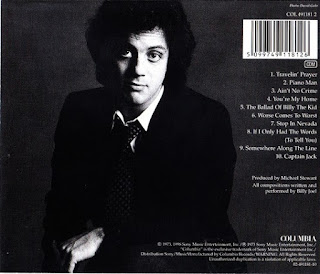For the longest time, I mistook Piano Man as being Billy Joel's third album instead of his second. When compared with Streetlife Serenade, it just seems so much more realized and complete. Each song lived-in and thought-through. While not a perfect album, it seems like a logical lead-in to his run of classic records that started with Turnstiles.
I don't know if my confusion speaks more to the unevenness of Streetlife Serenade or to the quality of Piano Man, but for the purposes of this review, let's say it's the latter.
As a whole, Piano Man feels like a collection of lost songs from Broadway productions. I say "productions" plural becasue this is not a concept album. The songs are all over the place thematically and musically, but what they share in common is a theatricality of presentation and a focus on storytelling.
To my mind the album is anchored by three epics that come at the beginning, middle, and end. First is the semiautobigraphical "Piano Man," and what else is there to say about it at this point? It's Billy's signature song, whether he likes it or not. The second is "The Ballad of Billy the Kid," an account of the life of the old west outlaw of the title. Historically, it's quite inaccurate, which is why Billy often intruduced it live by saying "This is a bullshit song," but the most intriguing part is the final verse where a modern day Billy who also becomes known east and west of the Rio Grande is cryptically introduced. Joel has said he wasn't referring to himself, despite the fact that this Billy also hails from Oyster Bay, Long Island. I don't fully believe him.
The final anchor is album closer "Captain Jack." I don't mind admitting that this song blew my mind when I first heard it in college. As I've said, I was reared on Billy Joel music, but we always had the LP version of Greatest Hits Volume I and II, so it wasn't until I got the CD that I discovered "Captain Jack." The subject matter - a profile of disaffected youth with mentions of "closet queens" and masturbation - was something I really didn't expect from Billy. And then my roommate Nick said, "You know "Captain Jack" is heroin, right?" No, I hadn't known that. Billy has since summarized the song as being about "a pathetic loser," but the lyrics clearly shows sympathy and understanding even as its main character disappears into oblivion.
(Do you get the theme here that Billy tends to treat his own work with dismissive bravado?)


Comments